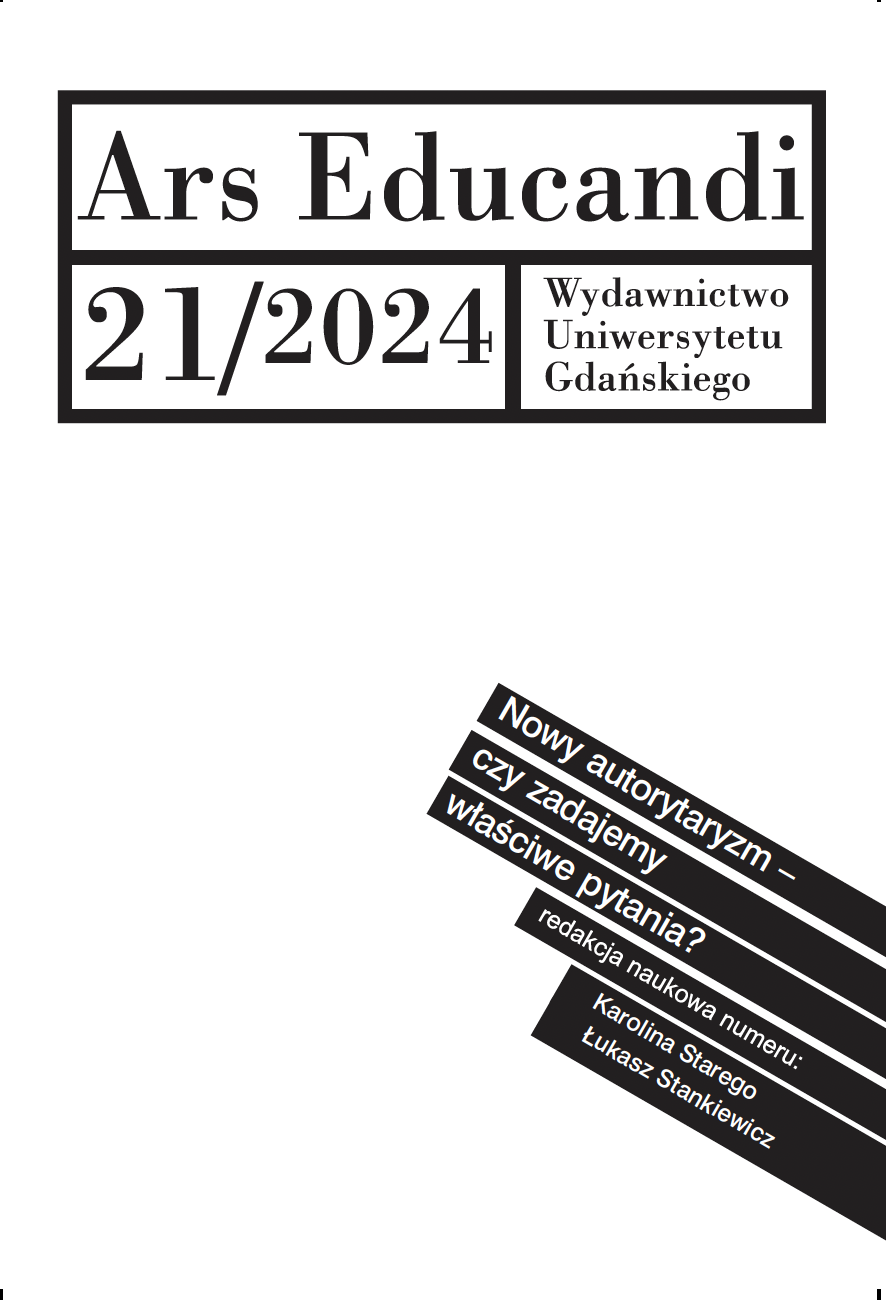Populism and Instrumentality: From Pathological Symptoms to Ontological Sinthomes for Educational Theory
DOI:
https://doi.org/10.26881/ae.2024.21.03Słowa kluczowe:
education, populism, instrumentality, sinthome, prosthesisAbstrakt
This contribution suggests a new reading of education's relationship with two problematic contemporary elements: populism and instrumentality. Usually, political and educational scientists portray populism as instrumentalizing education for goals outside its scope, while growing tendencies in educational philosophy go further to see education as heterogeneous with any instrumentality whatsoever. Both positions reduce the contingency, dislocation and antagonism that populism and instrumentality may inflict to education to an exceptional pathology that education can (should) bypass. By relying on Ernesto Laclau and Chantal Mouffe’s political ontology, this paper does not look at populism and instrumentality as antagonists to education only in how they are an external negativity disturbing education but also as symptoms of the internal negativity of education permitting its (re)articulation in the first place. The author estimates that this starting point can emancipate the study of education's relationship to populism and instrumentality from a simple description of scandalous states to an ontological investigation with epistemological and ethical results that touch more adequately on the urgent challenges of certain forms of populism and instrumentality to education.
Downloads
Bibliografia
Atif, A. (2021). Instrumentality after Radical Lack, Education, and Populism as Co-Prosthetic. Ars Educandi, (18), 129-142.
Biesta, G. J. (2001). How difficult should education be?. Educational theory, 51(4), 385.
Biglieri, P., & Perelló, G. (2019). Populism. In Routledge Handbook of Psychoanalytic Political Theory (pp. 330-340). Routledge.
Critchley, S. (2012). Is there a normative deficit in the theory of hegemony?. In Laclau (pp. 123-132). Routledge.
Dean, T. (2002). Art as symptom: Žižek and the ethics of psychoanalytic criticism. diacritics, 21-41.
De Cleen, B., & Glynos, J. (2021). Beyond populism studies. Journal of Language and Politics, 20(1), 178-195.
Derrida, J. (1976). The supplement of copula: Philosophy before linguistics. The Georgia Review, 30(3), 527-564.
Devenney, M. (2012). Ethics and politics in discourse theory. In S. Critchley, O. Machart (Eds), Laclau: A Critical Reader (pp. 133-149). Routledge
Freud, S. (1924). Mourning and melancholia. The Psychoanalytic Review (1913-1957), 11, 77.
Giroux, H. A. (2017). Neoliberalism’s war against higher education and the role of public intellectuals. The future of university education, 185-206.
Glynos, J. (2014). Death, fantasy, and the ethics of mourning. The social construction of death: Interdisciplinary perspectives, 137-160.
Glynos, J. (2001). The grip of ideology: a Lacanian approach to the theory of ideology. Journal of political ideologies, 6(2), 191-214.
Glynos, J. (2003). Radical democratic ethos, or, what is an authentic political act?. Contemporary Political Theory, 2, 187-208.
Glynos, J., & Howarth, D. (2007). Logics of critical explanation in social and political theory. Routledge.
Hansen, A. D. (2014). Laclau and Mouffe and the ontology of radical negativity. Distinktion: Scandinavian Journal of Social Theory, 15(3), 283-295.
Hodgson, N., Vlieghe, J., & Zamojski, P. (2018a). Education and the Love for the World: articulating a post-critical educational philosophy. Foro de Educación, 16(24), 7-20.
Hodgson, N., Vlieghe, J., & Zamojski, P. (2018b). Manifesto for a post-critical pedagogy (p. 110). punctum books.
Hudson, P. A. (2006). The concept of the subject in Laclau. Politikon, 33(3), 299-312.
Miller, J. A., & Lacan, J. (2013). The Ethics of Psychoanalysis 1959-1960: The Seminar of Jacques Lacan. Routledge.
Lacan, J. (2016). The Seminar of Jacques Lacan Book XXIII: The Sinthome. Polity Press, Cambridge.
Laclau, E., & Mouffe, C. (2014). Hegemony and socialist strategy: Towards a radical democratic politics (Vol. 8). Verso Books.
Laclau, E. (1987). Psychoanalysis and marxism (A G Reiter-McIntosh, Trans.). Critical Inquiry, 13(2): 330-333
Laclau, E. (1990). New reflections on the revolution of our time. Verso Trade.
Laclau, E. (1991). The impossibility of society. Reader, 122.
Laclau, E. (2000a). Structure, history and the political. In: Butler, J., Laclau, E, Žižek, S. (eds.), Contingency, Hegemony, Universality. Verso, London, p 182-213.
Laclau, E. (2000b). Constructing universality, In: Butler, J., Laclau, E., Žižek, S. (eds.), Contingency, Hegemony, Universality. Verso, London, p 281-308
Laclau, E. (2005). On Populist Reason. Verso: London.
Laclau, E. (2006). Why constructing a people is the main task of radical politics. Critical inquiry, 32(4), 646-680.
Laclau, E. (2012). Politics and ideology in Marxist theory: Capitalism, fascism, populism. Verso Books.
Laclau, E. (2014). The rhetorical foundations of society. Verso Books.
Lewis, T. E. (2020). Education for potentiality (against instrumentality). Policy Futures in Education, 18(7), 878-891.
Luhmann, N. (2013). Theory of Society. Volume 2. Stanford University Press, Stanford.
Marchart, O. (2018). Thinking antagonism: Political ontology after Laclau. Edinburgh University Press.
Masschelein, J., & Simons, M. (2013). In Defense of the School: A Public Issue, trans. Jack McMartin (Leuven, Belgium: Education, Culture & Society, 2013).
Mouffe, C. (2005a). The return of the political (Vol. 8). Verso.
Mouffe, C. (2005b). On the political. Psychology Press.
Mouffe, C. (2019). The populist moment. Simbiótica. Revista Eletrônica, 6(1), 06-11.
Nussbaum, M. C. (2016). Not for profit. In Not for Profit. Princeton university press.
Price, B., & Sutherland, M. (2008). Not a Ground but a Horizon: An Interview with Ernesto Laclau. World Picture, 2.
Simons, M., & Masschelein, J. (2017). School experiences: an attempt to find a pedagogical voice. Childhood & Philosophy, 13(28), 649-669.
Stavrakakis, Y. (2002). Lacan and the Political. Routledge.
Tony Carusi, F., & Szkudlarek, T. (2020). Education is society… and there is no society: The ontological turn of education. Policy futures in education, 18(7), 907-921.
Vlieghe, J., & Zamojski, P. (2019). Towards an ontology of teaching (p. 113). Springer International Publishing.
Žižek, S. (1989). The sublime object of ideology. Verso.
Žižek, S. (2002). The real of sexual difference. In Reading Seminar XX: Lacan’s major work on love, knowledge, and feminine sexuality (pp. 57-75). Albany: State University of New York Press.
Žižek, S. (2006). Against the populist temptation. Critical inquiry, 32(3), 551-574.

 Uniwersyteckie Czasopisma Naukowe
Uniwersyteckie Czasopisma Naukowe




